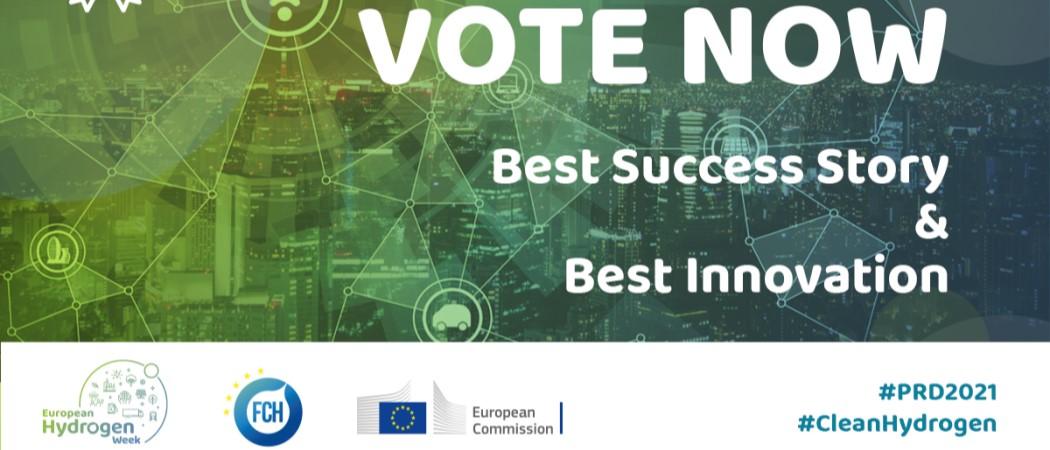Short-lists highlight the impact and future potential of hydrogen as a power source

Larger electrolysis plants, safer fuel tanks, clean power for ships, commercial aircraft, factories and even concerts: the entries for this year’s Fuel Cells and Hydrogen Joint Undertaking (FCH JU) Awards cover a wide spectrum of applications, highlighting the versatility of this clean power source.
Six FCH JU-funded projects are shortlisted for the Best Innovation category award. Other projects are grouped in 13 thematic areas for the Best Success Story category, which recognises breakthroughs funded by the FCH JU.
The winners for each category will be chosen by a public vote and announced during the second edition of European Hydrogen Week, to be held from 29 November to 3 December 2021. The Week features the European Hydrogen Forum and the FCH JU Programme Review Days.
You can vote for your favourite project or thematic area here
Innovation through cross-sector cooperation
In order for hydrogen to gain greater traction as a power source, FCH JU supports the development of viable business models, build the supply chains, scale up production of the technology and machinery and ensure that hydrogen is produced with renewable electricity.
The short-listed entries for the FCH JU Awards exemplify the joint undertaking’s drive to bring together research, industry and policymakers to develop the full potential of hydrogen as part of a circular economy.
Many of these FCH JU-funded projects already show the potential of hydrogen as a reliable, viable alternative to fossil fuels. While some of the projects are still early demonstrations, others have already deployed solutions at commercial scale in industry, bringing hydrogen as an alternative energy source to the public and contributing to a cleaner, healthier world.
Hydrogen at sea, in the air, and on land
The Best Innovation category recognises technological advances in the use of hydrogen as a clean energy source.
The six projects in line to win this year’s Innovation Award are REFHYNE, GrInHy2.0, EVERYWH2ERE, FLAGSHIPS, HyTunnel-CS and HySTOC. These projects have developed applications and technology that benefit heavy industry, provide portable clean power in cities, ensure emission-free maritime transport, allow for efficient transport of hydrogen, and improve the safety of hydrogen-powered vehicles.
Industrial-scale electrolysers are steadily growing in terms of capacity and efficiency. Project REFHYNE has built the largest electrolysis plant in Europe, while GrInH2.0 has developed a powerful, efficient, high-temperature electrolyser that is powered by wind-generated electricity. The latter project also uses waste steam from steelmaking to produce up to 200 m3 of hydrogen per hour more energy-efficiently than low-temperature electrolysers do.
The demonstration-to-market project EVERYWH2ERE has developed portable fuel-cell units that can power construction sites, music festivals and other temporary events in Europe’s cities. Such deployments could help increase social acceptance of hydrogen technology by eliminating the noise and pollution associated with diesel generators.
Two zero-emission hydrogen vessels developed by FLAGSHIPS in France and Norway are demonstrating the viability of marine-suitable polymer electrolyte membrane (PEM) fuel cells, while accelerating the drafting of rules for safe use of the technology in the shipping industry.
HyTunnel-CS is adopting a safety-first approach for hydrogen-fuelled vehicles in confined spaces, such as tunnels and underground car parks, by developing “Leak-no-burst” technology for compressed hydrogen storage tanks.
HySTOC is focused on enabling efficient transport of hydrogen without the need for bulky, high-pressure cylinders. Hydrogen is chemically bonded into a liquid hydrogen organic carrier non-flammable, non-toxic liquid, which can be safely moved to refuelling stations and stored in large quantities.
Transport, energy and market uptake
The award for the Best Success Story category will go to one of 13 thematic areas that has made a significant contribution to the development and application of hydrogen technology.
These success stories bring together several projects that combine the efforts of manufacturers, SMEs, research institutes and public authorities.
They are delivering hydrogen-powered systems in aircraft through projects, such as FLHYSAFE and HEAVEN, and more efficient transport of hydrogen (HySTOC), rolling out refuelling stations (H2ME, H2ME 2), designing fuel tanks (TAHYA, SH2APED) and scaling up fuel cell production for cars (DIGIMAN, Fit-4-Amanda).
Over the past 10 years, demonstration projects, such as CHIC, JIVE, JIVE 2 and MEHRLIN, have achieved significant progress in reducing the additional costs to operators of fuel cell buses, when buying and running buses and hydrogen refuelling stations. This allowed several generations of buses from various EU manufacturers to be demonstrated in different climates, alongside the building of related hydrogen refuelling infrastructure.
Refineries, large-scale manufacturers and public organisations (Demo4Grid, DJEWELS, H2FUTURE and REFHYNE projects) have developed and demonstrated innovative electrolysers that extract “green” hydrogen using renewable energy on a large scale for industry. At the same time, thanks to the NEPTUNE and PRETZEL projects, electrolysers are becoming more efficient and cost effective for industries and gas distributors to integrate into their operations.
Cheaper commercial-size solid-oxide fuel cell systems under development could enable households and businesses to produce in a cost-effective manner low-carbon electricity and heat. Through the ENE.FIELD, PACE, INNO-SOFC, NELLHI projects, collaborations between European companies and research institutions have improved components and the assembly of the systems.
Project REMOTE is demonstrating the technical and commercial viability of fuel-cell-based energy-storage solutions that can replace diesel generators in off-grid locations.
The last three finalists bring together projects focused on the sustainability of hydrogen technology (FC-HYGUIDE and SH2E), developing and updating hydrogen sector standards (PRHYDE, E-SHYIPS, HYDRAITE) and building self-sustaining ‘hydrogen valleys’ (BIG HIT, HEAVENN, GREEN HYSLAND).
Join us for the 2021 European Hydrogen Week to take stock of the progress made by the FCH JU’s projects and find out more about the future of the clean hydrogen technology. The occasion will also mark the public launch of the Clean Hydrogen Partnership – the successor of the FCH JU.




 A unique international forum for public research organisations and companies to connect their external engagement with strategic interests around their R&D system.
A unique international forum for public research organisations and companies to connect their external engagement with strategic interests around their R&D system.